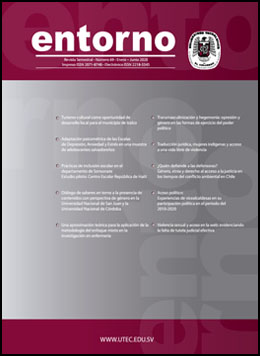Legal translation, indigenous women and the access to a life free of violence
DOI:
https://doi.org/10.5377/entorno.v0i69.9567Keywords:
Women - Mexico - Human rights, Crimes against women - Mexico, Indigenous peoples - Legal situation - Mexico, Linguistic rights - MexicoAbstract
In 2017, the translation of the Ley de Acceso de las Mujeres a una Vida Libre de Violencia del Estado de México (Law of Access of Women to a Life Free of Violence of the State of Mexico) was published into five of the most prevailing indigenous tongues in said (judicial) identity. Although this action could be perceived as progressive and inclusive, if one takes into consideration that Mexico has been characterized by identity, judicial and linguistic tensions, it is imperative to critically reflect around the role that translation plays, and will play, in relation to the access to a life free of violence for the indigenous women. With this purpose, the first stage of this investigation took into consideration the socio-legal conception of the originary peoples, the place that the national tongues take and the particular situation indigenous women face. Also, three key people were interviewed for the translation of this law; and last, an analysis was made of the function of said translation based on the context where it is inserted. The collected data suggests that the role of this translation is ambivalent. This can be seen from two different perspectives: number one, as a tool for empowerment; number two, as a tool for the perpetuation of a judicial ethnocentrism and violent racism that troubles both the government entities and the civil society. In the second stage, still under development, a representative group of Mazahua women will be interviewed in order to know the degree of socialization of the terms proposed by the translator; in addition, the impact of the translation on their lives will be inquired.
Downloads
532
Downloads
Published
How to Cite
Issue
Section
License
© Entorno
It is required that the authors transfer the right of re-production of their articles to the Entorno Journal

